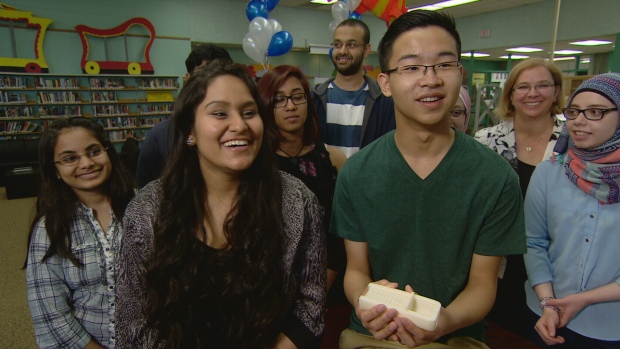Mississauga students win $50K for developing microbead filtration system

The issues we’ve created, we should solve them,’ says student who helped develop project
By Errol Nazareth, Morgan Dunlop, CBC News
They measure less than a millimetre across but they pose a massive threat to our Great Lakes, and a group of Mississauga high school students wants to help zap them.
Fired up by what they see as inaction against the flow of microbeads into our waters, Grade 11 and Grade 12 students from Gordon Graydon Memorial Secondary School designed a microbeads filtration system and were awarded $50,000 in Samsung technology for their school.
Plastic microbeads: small bits with a big impact
Samsung Canada’s first-ever Solve for Tomorrow Challenge, which was launched last September, required students to use science, technology, engineering and math to solve a community issue. Eleven national finalists were selected from a pool of 55 semi-final submissions, and Gordon Graydon and South Colchester Academy in Nova Scotia came out on top.
They were presented with the prize on Tuesday.
“Microbeads are tiny plastic beads made out of polyethylene and other plastics that are used in soap, creams and toothpaste and since they have the same density as water they don’t get filtered out at water treatment plants,” Grade 11 student Adrian Sin told CBC News.
Scientists and environmentalists say these tiny plastic pebbles, which are non-bio degradable, are hurting fish, along with other wildlife and may even be damaging human health.
Sin, who says he’d like to study civil engineering after graduating, explained how their system would catch the miniscule beads.
“The solution we came up with is a half-pipe with a negatively charged grid in the front and positively charged grid along the top,” he said. “When water enters the pipe, the microbeads are negatively charged and are attracted to the positively charged plate where they can be removed.”
Toxic threats to Great Lakes demand action, environmentalist says
Muskan Sethi, who’d also like to pursue civil engineeering, said the filtration system is similar to equipment that “cleans smoke from factories so we tried adapting it to water.”
When asked what inspired the project, Sethi said, “Everyone should live safely. The issues we’ve created, we should solve them.
“We’re all science students and very passionate about science and everyone’s committed because we all want to make a change.”









Leave a Reply